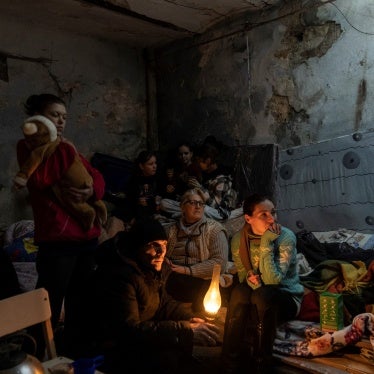(Brussels) - The European Union's decision to open a special criminal investigation into alleged crimes in Kosovo and Albania after the Kosovo war is a welcome step for justice and the rule of law in the Balkans, Human Rights Watch said today.
The investigation's success hinges on the appointment of an experienced senior prosecutor, an effective program to relocate witnesses outside the region, and full backing by EU member states and the US government, Human Rights Watch said.
"This EU special investigation brings us closer to justice for serious crimes committed after the Kosovo war," said Benjamin Ward, deputy Europe and Central Asia director at Human Rights Watch. "But an experienced senior prosecutor with clout is needed to build an effective team, guarantee witness security, and garner support from key governments, including the United States."
Known as a "task force," and headed by a lead prosecutor, the special investigation will formally be a part of the European Union Rule of Law Mission in Kosovo (EULEX), but will be based in separate facilities in Brussels and Pristina.
The investigation is charged with examining allegations of abductions, disappearances, executions, organ trafficking, and other serious crimes. It will examine the alleged coordination by former commanders of the Kosovo Liberation Army and current Kosovo leaders, including Prime Minister Hashim Thaci.
The allegations were presented in a December 2010 Council of Europe report prepared by Swiss Senator Dick Marty.
The European Union's Political and Security Committee approved the task force on May 25, 2011, bringing with it the formal backing of all 27 EU member states.
The support of the United States for the investigation is vital, given the close relations it has with the governments in Kosovo and Albania, Human Rights Watch said.
"As a primary backer of the NATO intervention in 1999 and Kosovo's subsequent independence, the US has a responsibility to promote and protect the rule of law in Kosovo," Ward said. "That means fully supporting a rigorous investigation into all credible allegations of serious crimes."
A revamped witness protection program, including the ability to relocate witnesses outside Kosovo, is central to the success of the special investigation, Human Rights Watch said.
Previous investigations into political violence and organized crime in Kosovo have been undermined by the reluctance of witnesses to come forward, fearing retaliation against them or their families. Relocation outside the region is often the only way to protect witnesses, but western governments have been generally reluctant to do so, largely for domestic political reasons, Human Rights Watch said.
"The bottom line is that this investigation will only succeed if US and European governments commit to accept witnesses and family members whose safety requires relocation," Ward said.
Four hundred and seventy people went missing after the 1999 war ended, and NATO troops had entered Kosovo. Ninety-five of these people are ethnic Albanians; the rest are non-ethnic Albanians, mostly Serbs.
"This special investigation can help bring closure to the horrors of the Kosovo war," Ward said. "But it's critical that it gets the necessary support to do the job right."





